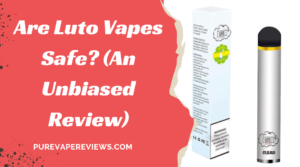
GERD is a common condition that affects a large number of people worldwide. Unpleasant symptoms happen due to stomach acid seeping back into the esophagus. While food and obesity are well-known risk factors for GERD, there is rising worry about the impact of vaping on this condition. Can vaping make GERD worse? This is something people looking to get answers for.
This guide explores the potential link between vaping and worsening GERD symptoms, shedding light on an emerging health concern.
Understanding GERD: A Brief Overview
Understanding GERD requires a glimpse into digestive health. GERD, or Gastroesophageal Reflux Disease, initially involves stomach acid flowing backward. This reverse flow irritates the esophagus, causing discomfort. Commonly, people experience heartburn, a burning chest sensation. Moreover, they may taste sour liquid or regurgitate food.
Additionally, chronic cough and sore throat often signify GERD. Significantly, several factors, like obesity and diet, trigger its onset. Consequently, doctors recommend lifestyle changes and medications for treatment. GERD affects many, but understanding its symptoms can guide effective management.
Potential Impact of Vaping on GERD- Can Vaping Make It Worse?
While research is still in progress, it is evident that vaping may impact GERD. Vaping should be approached with caution by GERD patients.
Vaping has recently grown in popularity among people of all ages. Its effects on GERD are being studied thoroughly. However, here is how vaping can significantly impact the GRRD and make it even worse.
- Nicotine Impact
To begin with, nicotine is frequently present in e-liquids. Nicotine can potentially impair the oesophageal sphincter, the muscle that prevents stomach acid from flowing backward.
- Stomach Acid Production
Nicotine stimulates stomach acid production, which is worse in GERD. Increased acid can exacerbate GERD symptoms in sensitive individuals.
- Inhaling Vapors
Inhaling the vapor can irritate your stomach pain to a great extent. The esophagus, being sensitive, might react adversely to this irritation.
- Influence on Diet
Vaping flavors might impact diet choices as well. Consuming acidic foods worsens GERD, and certain flavors might encourage such choices.
Potential Symptoms to Watch on GERD
Identifying these potential GERD symptoms early on can prevent complications and enhance the quality of life for people suffering.
- Heartburn
Heartburn, commonly described as a burning sensation in the upper belly or chest, is the main symptom of GERD. Usually, it happens after eating, especially when leaning down or lying down.
- Chest Pain
Chest pain related to GERD can mimic cardiac issues, but it is usually a burning discomfort or pressure in the chest, distinct from cardiac pain.
- Chronic Cough
GERD can trigger a chronic cough, often mistaken for allergies or respiratory issues. The cough may worsen at night or after meals.
- Sore Throat and Hoarseness
Acid reflux can irritate the throat, leading to a persistent sore throat and hoarseness, especially in the morning.
Treatment and Management of GERD
Effective treatment and management are crucial for symptom relief and long-term harm reduction. Here are five essential strategies:
- Lifestyle Modifications
GERD symptoms can often be improved through lifestyle changes. Firstly, individuals should maintain a healthy weight as obesity can exacerbate the condition. Additionally, adopting an upright posture after eating and avoiding tight clothing can reduce pressure on the stomach and lower the risk of acid reflux.
Moreover, dietary adjustments such as avoiding trigger foods (spicy, acidic, and fatty foods), eating smaller, more frequent meals, and refraining from lying down immediately after eating can provide significant relief.
- Medications
Pharmaceutical interventions can be highly effective in managing GERD. Proton pump inhibitors (PPIs) like omeprazole reduce stomach acid production, alleviating symptoms and promoting esophageal healing. H2-receptor antagonists, such as ranitidine, reduce acid production but are less potent than PPIs. Antacids provide rapid but short-term relief by neutralizing stomach acid. In some cases, prokinetics may be prescribed to enhance esophageal motility.
- Dietary Management
Patients should be educated on dietary choices that minimize GERD symptoms. High-fiber foods like fruits and vegetables can prevent constipation, which may exacerbate GERD. Furthermore, low-fat and lean protein sources may be desirable since fatty diets relax the lower oesophageal sphincter, allowing acid to enter the esophagus. Caffeine, alcohol, and carbonated beverages should also be consumed cautiously or avoided because they might cause reflux.
- Elevating the Head of the Bed
Elevating the head by six to eight inches during sleep can assist gravity in restricting stomach acid from running back into the esophagus. This simple adjustment can significantly reduce nighttime GERD symptoms. Patients can achieve this by placing blocks under the bedposts or using a wedge-shaped pillow.
- Surgery (Anti-reflux Surgery)
Surgical intervention may be necessary for individuals who do not respond to lifestyle changes and medication or have severe complications. Fundoplication is a standard surgical procedure that involves wrapping the top of the stomach around the lower esophagus, reinforcing the lower esophageal sphincter. This prevents acid reflux and improves symptoms. It’s usually considered when other treatments fail or when there are severe complications like Barrett’s esophagus.
Conclusion
In conclusion, while vaping may have been marketed as a safer alternative to traditional smoking, emerging evidence suggests it may worsen GERD symptoms. The mechanisms by which vaping can impact GERD include increased pressure on the LES, nicotine’s relaxing effect, and the potential for inflammation.
While more research is needed to understand this connection fully, individuals with GERD should be cautious about vaping and consider cessation as part of their management plan. It is essential to consult with a healthcare professional for personalized advice on managing GERD and making informed choices regarding vaping.








